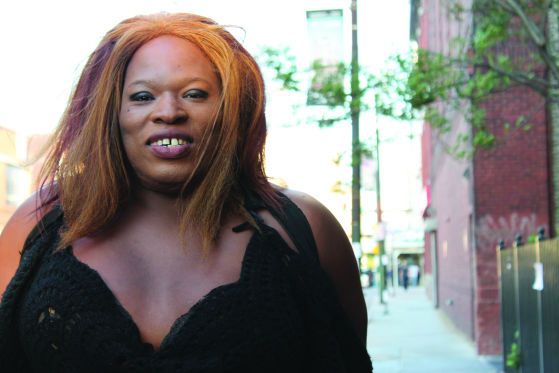 Nomi Michaels Devereaux had walked from the Jewel Osco grocery store in Lakeview, IL with her boyfriend. They stopped and she waited while he went into a friend’s home to pick up a game system. While she was waiting, and holding six bags of groceries, she was approached by police who removed the groceries and handcuffed her. Then they took her to a police station, where she was forced to remove her bra in front of men…who then mocked her.
Nomi Michaels Devereaux had walked from the Jewel Osco grocery store in Lakeview, IL with her boyfriend. They stopped and she waited while he went into a friend’s home to pick up a game system. While she was waiting, and holding six bags of groceries, she was approached by police who removed the groceries and handcuffed her. Then they took her to a police station, where she was forced to remove her bra in front of men…who then mocked her.
Later she learned she had been arrested for solicitation.
She responded in a way that few transwomen do. She reported the incident. That report eventually resulted in a new general order for Chicago police. The order, among other things, says that transpeople should not be subjected to searches any more frequently…or more invasively…than nontransgender people. It also insists that transgender identity is not by itself evidence that a crime is occurring.
The phenomenon of police wrongly assuming that transwomen are engaged in sex work is known as walking while trans.
In point of fact Devereaux works at The Crib, which is an LGBTQ-affirming shelter operated by The Night Ministry, which opened as a pilot program in January, 2011. She was kicked out of her family after her mother died of breast cancer when she was 16.
Her story of homelessness, recalled fifteen years later, is available here.
In August another Illinois transwoman filed a lawsuit against the town of Cicero complaining that police incorrectly profiled her as a sex worker and then harassed, disrespected and threatened her, refusing even to acknowledge her by her legal name. Cicero refuses to acknowledge any wrongdoing in the case, but did settle the case, with the woman receiving a $10,000 award.
Other Chicago-area transpeople say that police also refuse to respond when transpeople are reporting a crime. A woman in Auburn Gresham, on the far south side of the city, reported that she was being harassed by a man and tried to stop a passing police cruiser by flagging it down in the middle of the street…but the car did not stop and police did not intervene to stop the harassment.
A Long Island City (in Queens, NYC) transwoman filed suit against Nw York City’s Human Resources Administration in November. Jolie Estrella, 25, went to the HRA’s East River Job Center in November 2011 to file a an official change of name form. She carried with herself the necessary documents to file for a change of gender marker. Without the correct name, she would not be able to access government-issued benefits.
They were bewildered. One of the girls was confused and didn’t know what to do. She went to a supervisor, or a coworker, someone who she respected. He accused me of having fraudulent documents.
–Jolie Estrella
She left without accomplishing what she had gone for, very discouraged.
She tried again at the end of the month, hoping to change both her name and legal sex designation in the HRA database. This time she dressed down, wearing a sweatsuit and expecting to be received as a man.
She received no better treatment. She was told, “It’s OK if you are gay, as long as you are not transgender.”
When she asked to speak to a supervisor, the man refused to use her legal name in addressing her and instead of sending her to the supervisor, he sent her to security guards who ordered her to leave the building. When she refused, she was dragged into an office where she was issued a summons and a citation, both in her former name.
The city’s lawyers say only that they will be reviewing her lawsuit.
HRA says:
HRA treats its clients seeking assistance with dignity and respect. Our policies and continual trainings ensure staff members comply with laws that protect transgender and gender non-conforming people from discrimination.
–Anonymous HRA spokeswoman
Estrella went without benefits for six months because she could not get the name changed on her Electronic Benefit card, which is similar to a debit card, wich can be used to purchase food stamps.
The lawsuit filed on Nov. 20 states that these alleged actions violate state and city discrimination laws as well as HRA policy No. P-09-22, “Serving Transgender, Transsexual, and Gender Nonconforming Individuals,” which was issued in December 2009 after years of advocacy. Under the directive, staff should ask clients what their preferred names, titles, and gender pronoun are, and it states that not using that information is a form of harassment.
Estrella is asking that the HRA provide effective training for all managment, agents and employees on State and City HUman Rights Laws, particularly with respect to the rights of transpeople; for HRA to distribute written procedures on the proper treatment of transgender clients to all staff and recipients of benefits; and damages allowed by law, according to her attorney, Richard Saenz, of the LGBT Advocacy Project at Queens Legal Services.
Ms. Estrella has a right to be treated with respect and to have her documents reflect who she is, as does any applicant for benefits. Transgender individuals are constantly forced to accept harassment or give up their benefits. That’s not a choice that anyone should be forced to make, particularly at agencies that serve as a last defense against poverty, homelessness, and poor health. As a City agency, HRA must abide by the laws and regulations of both the State and New York City.
Pauline Park, chair of the New York Association for Gender Rights Advocacy and executive director of Queens Pride House, said the story was not unusual.
It’s more common than you think, but no one knows because no government agency keeps statistics on these sort of cases. They’ve never made public statistics on discrimination cases filed against government agencies broken down by how many against the HRA or judges or broken down by benefit [sought when the discrimination was committed.]
–Pauline Park
Betsy Herzog, spokeswoman for the City Commission on Human Rights said that the city probably keeps such statistics, but she could not access them, since the CHR has not been allowed in their offices since Superstorm Sandy.
In 2002 the City Council passed a bill amending the city’s Human Rights Law to include transgender individuals. The law protects people against discrimination on the basis of gender identity when applying for employment and housing.
Here we are 10 and half years later and a city agency is still violating the law of the City of New York. This demonstrates the need for education of public, city agencies and judges.
In April of this year an administrative law judge ordered the HRA to process Estrella’s application for change of legal name and provide her with retroactive benefits.
In June another transwoman filed a suit against the HRA through Manhattan Legal Services and South Brooklyn Legal Services seeking damages when her change of name documents were denied and staff refused to use the correct pronouns.
 Meanwhile Charlotte, NC, City Manager Curt Walton made a decision to add protections for transgender workers to that city’s non-discrimination policy. The new policy took effect immediately.
Meanwhile Charlotte, NC, City Manager Curt Walton made a decision to add protections for transgender workers to that city’s non-discrimination policy. The new policy took effect immediately.
The policy now reads:
No employee or applicant for employment shall suffer discrimination because of race, religion, color, sex, national origin, sexual orientation, age, disability, political affiliation, or on the basis of actual or perceived gender as expressed through dress, appearance or behavior.
The federal EEOC has said that discrimination based on gender identity was illegal and that led to Walton’s change to the policy.
Scott Bishop, chair of the Mecklenburg LGBT Political Action Committee, or MeckPAC, told qnotes that he and other members of his group recently met with Walton to discuss the changes. The group was previously successful at convincing Walton to add “sexual orientation” to the same policy, a change the city manager made in April 2010.
At that time the city attorney was Mac McCarley, who has since retired. McCarley opposed adding protections for gay and transgender workers. Even after “sexual orientation” was added to the policy, McCarley advocated against adding protections for transpeople.
We are not recommending that you include ‘gender identity’ as a protected status. This is a relatively new term, has no recognized legal definition, and is highly subjective.
–McCarley, in a 2010 memo to Walton
He continued to hold that stance even after the city was sued because of discrimination against a transgender worker. Anne Marie Clukey worked for the city for two years before being fired in 2006. She was passed over for promotion by her supervisor Karen King after King discovered that she had undergone gender reassignment surgery. King became hostile…which eventually led to the termination of Clukey’s employment.
At the time, McCarley was quoted as saying:
Transgendered individuals do not have any rights under the federal employment discrimination laws.
He said the city would refuse to take responsibility in the case. The case ended up being settled in August of 2010.
Internal human resources policies are delegated to the city manager. Walton retired just one week after approving the new policy.
On the day of Walton’s retirement, Kirkwood, Missouri joined about a dozen other local Missouri governments which have passed anti-discrimination ordinances prohibiting discrimination on the basis of sexual orientation and gender identity.
There was other story out of Charlotte-Mecklenburg:

1 comments
Author
…has been international in nature. On this last Friday of 2012 it was time to share some local stories which have been neglected.